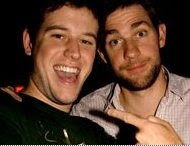 Lyons and Mankiewicz are not the only critics who do not recommend Synecdoche, New York. Far from it--this will be one of the more controversial films of the year. It currently has a 66 on both Metacritic and the Tomatometer--that is "fresh", but not by much. Holy wars will be fought over whether it is an excessive, overly long exercise in navel-gazing or a brilliant, experimental take on the life of an artist. I tend much more toward the latter.
Lyons and Mankiewicz are not the only critics who do not recommend Synecdoche, New York. Far from it--this will be one of the more controversial films of the year. It currently has a 66 on both Metacritic and the Tomatometer--that is "fresh", but not by much. Holy wars will be fought over whether it is an excessive, overly long exercise in navel-gazing or a brilliant, experimental take on the life of an artist. I tend much more toward the latter.Charlie Kauffman is not the first director to make a movie about the process of filmmaking, 8 1/2 being only the most famous example. What is different about Kaufman is that he seems like somebody who could spend his entire life writing and directing this sort of project. Of course, Synecdoche, New York is only the second film of Kaufman's in this genre after Adaptation, and this one is about somebody working in theatre and not film. Nonetheless, Kaufman loves the self-referential and the blurring of the lines between art and reality so much that we can't help but expect him working along these same lines more in the future.
Kaufman is a master of this type story and he is far from having exhausted his talents, even if it seems like he is covering the same territory as his previous films. Synecdoche succeeds in a very careful balancing act of creating a bizarre, surreal comedy on the one had and a poignant, aching drama of anxiety and failure on the other. In the hands of another writer or director this material could easily descend into an annoying mess of cinematic excess littered with clever scenes, random oddities, sound and fury. But this does not feel like a tired old retread by somebody who is remaking the same story over and over--although a fear of doing this is one of the subjects of the movie. No, this is a deeper, even more complex, look at the same themes Kaufman has looked at in the past and it succeeds brilliantly.
Philip Seymour Hoffman stars as the "Charlie Kaufman" character--a theater director named Caden Cotard living in Schenectady*, New York. Caden eventually finds that directing plays written by other people just isn't satisfying enough and winning a MacArthur Genius Grant allows him to finally make the intimate play that he always wanted to write. This rambling work written on the fly over many years--based on Caden's life--is the "synecdoche" in Synecdoche.
This is the rough outline of the story, but anybody who has seen Adaptation or Being John Malevich knows that plot highlights simply do no justice to a Charlie Kaufman movie. Like those two, the subject of this film is actually the warped mirror of reality that Kaufman shows us, and Kaufman is interested both in the new version of reality and the process of warping in itself. The casting of the play with characters based on Caden and his theater troupe, who then go on and cast another set of characters, and so on, is just one part of this twisted delusion.
As I said above, this could have easily devolved into self-absorbed excess, but the real story underlying the bizarre and unexpected is Caden's anxiety with his life and his career. He constantly thinks he is sick and dying, finding blood in his urine and stool, feeling his body slowly give up on him. His career as a director feels unsatisfying, being a big fish in a small pond directing The Death of a Salesman in a small town instead of his own work in Manhattan. But as the story progresses, the comedic anxiety develops real poignancy.
For example, Caden's wife (played by Catherine Keener) leaves him and takes their daughter with her to Germany. Caden's attempts to contact her find him encountering surreal barriers which could easily have resulted in so many "my, isn't that clever" moments. Instead, there is real anguish in these developments which, had they appeared in a "straight" film without Kaufman's breakdown of reality, would have likely played out as merely overwrought melodrama. These strange obstacles are both appropriately surreal and while at the same time portraying the real gulf between father and daughter.
Part of what Kaufman is doing here is displaying the craft of drama. For example, we later see a scene of a funeral in the play-within-a-play with all the features of a scene of Hollywood sorrow, including a priest delivering a powerful eulogy and rainfall on cue. One could take this as Kaufman showing off how he plucks our heart strings and that this is just a wink and a nod to let us know what he is doing. I think that is part of it, but I can't dismiss the real sense of anxiety in the film as just a trick being played on us. On the contrary, what we see is Caden's life being taken over by his project as he eventually becomes so numb to reality that he can only express it with the phony tools of his trade.
Years go by, people get older, the world around him descends into chaos, and Caden is no nearer the completion of his play. All he has produced is an enormous monument to his own inadequacy. Maybe, we think, he would have been happier back in Schenectady.
* It turns out that "Synecdoche" rhymes with "Schenectady" and is "a term denoting a part of something is used to refer to the whole thing".





No comments:
Post a Comment